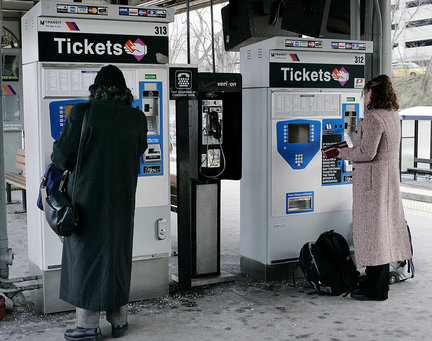Thanks for voting in the 2011 Streetsie award poll, where Streetsblog readers weigh in on the good, the bad, and the ugly of the year. Santa knows if you've been multimodal, and he knows if you've been using cost-effectiveness metrics and low-carbon forms of transportation, so price road use fairly for goodness' sake! We start our round-up of the year with the low point. (It can only get better from there.)
Transit Saved the Day (But Who Will Save Transit?): There’s no two ways about it: 2011 was a rough year. And 59 percent of you said the roughest part was watching the tumult roiling our transit agencies.

In 2011, the low economy and high gas prices helped showcase the need for affordable transportation options, and people flocked to transit – only to find troubled systems facing budget cuts, fare hikes, and service reductions.
The American Public Transportation Association reported a bump of nearly 86 million transit trips over the first six months of the year. Did Congress respond by thanking transit agencies for doing yeoman’s work to keep American households above water during a time of economic hardship? Not on your life! Congress kept flailing and bickering over a transportation bill that keeps slipping further and further out of reach while hardworking transit agencies withered on the vine. According to APTA, more than half of U.S. transit agencies have raised fares or reduced service in the past year, and many more are planning to do so soon.
Somehow, increased ridership didn’t translate into more robust funding or even a little begrudging respect.
If the People Lead, the Leaders Will Follow: But we didn’t flee the country and the whole political / economic / cultural / transportation mess here, did we, Streetsblog readers? We may have wanted to hightail it to Copenhagen when times got tough, but we stayed because we were inspired by a few little beacons of hope.
We cheered on Mayor Rahm Emanuel's quick work reforming Chicago's transportation network, with his plans to add 100 miles of bike lanes, implement "congestion parking" fees, upgrade commuter rail and start the country's most ambitious new bus rapid transit system. And we perked up considerably when a day without cars in Los Angeles turned out to be no disaster at all, and bicyclists beat an airplane to its destination.
But the real evidence that the tide was turning came from voters from Alpena, Michigan, to Clark County, Washington, agreed to pay more in taxes to support transit service. In those ballot initiatives, transit won 79 percent of the time, saving Dial-A-Ride service, bus routes, bus stop upgrades, operations, and more. For 46 percent of you, this was the most hopeful, most inspiring thing that happened this year.
Shades of Gray: The year wasn’t all black and white. There were some real double-edged swords -- like the positive news of high transit ridership, offset with the dismal news of cutbacks.
Then there was the high-speed rail brouhaha, with three governors returning their share of federal funds to great fanfare. It gave Ray LaHood a lot of ‘splaining to do, which he ably did, but most of all, it freed that money for more appreciative states to improve their own rail systems. A good chunk of the returned funds went to the Northeast Corridor, everyone’s best bet for successful high-speed rail.
Calls to expand transit out to the suburbs – to improve access for seniors or to reach far-flung employment centers – were also met with some serious ambivalence. Obviously transit is a better option than continued automobile reliance, but does transit expansion reward terrible planning and job sprawl at the expense of the urban core?
Streetsblog readers also did some serious thinking about the impact of private money on public infrastructure projects and realized that public-private partnerships – while often necessary or at least extremely useful in getting projects off the ground – can also carry their share of risks.
But the most double-edged of all double-edged swords of 2011 was the fact that absolutely nothing got done on transportation and infrastructure. We saw more extensions of the current transportation bill and more proposals for infrastructure spending go down the toilet. It’s hard to see time wasting like this when the need for reform is so urgent. But at the same time, we’ve seen so many awful proposals – to tie infrastructure spending to oil drilling, for example, or to spend lots more money building lots more roads – that it just might be better to wait for consensus on a good idea, rather than swallow a bad one.
Looking Forward to That Recall Election in Wisconsin: What is it that fascinates state DOTs so much about ribbon cuttings on big highway projects? The state-level love affair with roads -- at the expense of bicycle and pedestrian safety infrastructure and public transportation -- continued in 2011. Three governors chose Tea Party politics over the needs of their states and rejected federal high-speed rail funds. Texas kow-towed to oil companies and went ahead with plans for a needless outer beltway in Houston. Florida and Maine chose sprawl over smart growth, despite overwhelming evidence that their choices were costing the states dearly.
But nothing was half as outrageous in the eyes of Streetsblog readers as Wisconsin Gov Scott Walker's big show of fiscal discipline when it came to rail, only to turn around and go into debt for highway projects. The mind-boggling hypocrisy earned him a Streetsie award for Getting It All Wrong (the State Edition).
Coming up tomorrow: Cities that got it all wrong, Letdowns of the Year, Annoying Distractions From Real Problems, and more.





